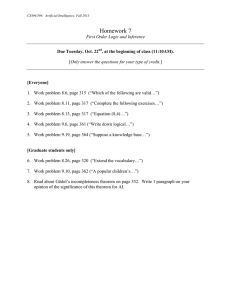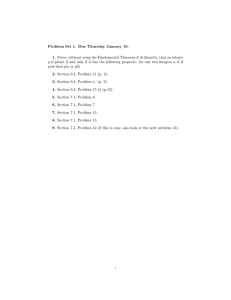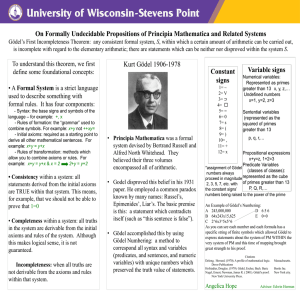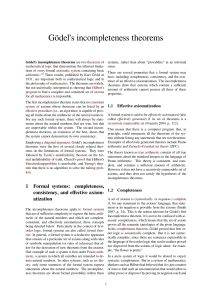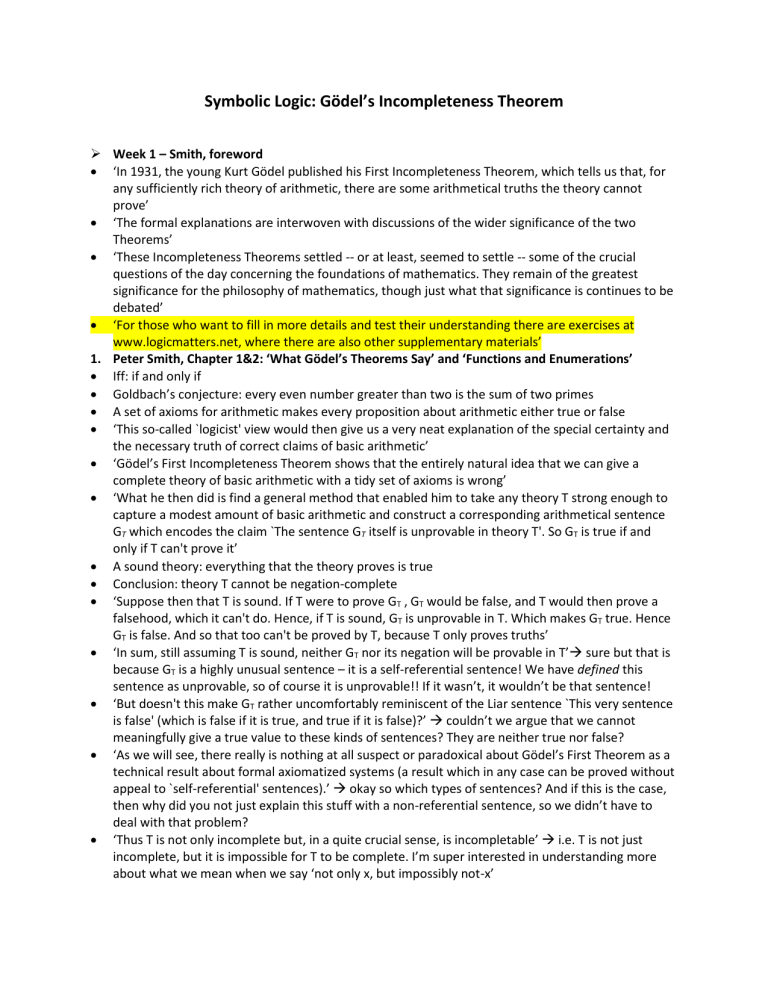
Symbolic Logic: Gödel’s Incompleteness Theorem Week 1 – Smith, foreword ‘In 1931, the young Kurt Gödel published his First Incompleteness Theorem, which tells us that, for any sufficiently rich theory of arithmetic, there are some arithmetical truths the theory cannot prove’ ‘The formal explanations are interwoven with discussions of the wider significance of the two Theorems’ ‘These Incompleteness Theorems settled -- or at least, seemed to settle -- some of the crucial questions of the day concerning the foundations of mathematics. They remain of the greatest significance for the philosophy of mathematics, though just what that significance is continues to be debated’ ‘For those who want to fill in more details and test their understanding there are exercises at www.logicmatters.net, where there are also other supplementary materials’ 1. Peter Smith, Chapter 1&2: ‘What Gödel’s Theorems Say’ and ‘Functions and Enumerations’ Iff: if and only if Goldbach’s conjecture: every even number greater than two is the sum of two primes A set of axioms for arithmetic makes every proposition about arithmetic either true or false ‘This so-called `logicist' view would then give us a very neat explanation of the special certainty and the necessary truth of correct claims of basic arithmetic’ ‘Gödel’s First Incompleteness Theorem shows that the entirely natural idea that we can give a complete theory of basic arithmetic with a tidy set of axioms is wrong’ ‘What he then did is find a general method that enabled him to take any theory T strong enough to capture a modest amount of basic arithmetic and construct a corresponding arithmetical sentence GT which encodes the claim `The sentence GT itself is unprovable in theory T'. So GT is true if and only if T can't prove it’ A sound theory: everything that the theory proves is true Conclusion: theory T cannot be negation-complete ‘Suppose then that T is sound. If T were to prove GT , GT would be false, and T would then prove a falsehood, which it can't do. Hence, if T is sound, GT is unprovable in T. Which makes GT true. Hence GT is false. And so that too can't be proved by T, because T only proves truths’ ‘In sum, still assuming T is sound, neither GT nor its negation will be provable in T’ sure but that is because GT is a highly unusual sentence – it is a self-referential sentence! We have defined this sentence as unprovable, so of course it is unprovable!! If it wasn’t, it wouldn’t be that sentence! ‘But doesn't this make GT rather uncomfortably reminiscent of the Liar sentence `This very sentence is false' (which is false if it is true, and true if it is false)?’ couldn’t we argue that we cannot meaningfully give a true value to these kinds of sentences? They are neither true nor false? ‘As we will see, there really is nothing at all suspect or paradoxical about Gödel’s First Theorem as a technical result about formal axiomatized systems (a result which in any case can be proved without appeal to `self-referential' sentences).’ okay so which types of sentences? And if this is the case, then why did you not just explain this stuff with a non-referential sentence, so we didn’t have to deal with that problem? ‘Thus T is not only incomplete but, in a quite crucial sense, is incompletable’ i.e. T is not just incomplete, but it is impossible for T to be complete. I’m super interested in understanding more about what we mean when we say ‘not only x, but impossibly not-x’ ‘What gives Gödel’s First Theorem its real bite is that it shows that any nicely axiomatized and sound theory of basic arithmetic must remain incomplete, however many new true axioms we give it’ why is it known as the Incompleteness Theorem? Should rather have been called the Incompletability Theorem ‘At this point it can begin to seem that we must have a rule-transcending cognitive grasp of the numbers which underlies our ability to recognize certain `Gödel sentences' as correct arithmetical propositions’ (bottom of p. 5) I don’t understand (the significance of) what is being said here. What does it mean to have a rule-transcending cognitive grasp of numbers? And why does that imply we cannot be machines? The definition here refers to rules governing the machine’s behaviour, not rules governing whatever topic the machine is engaging in (like arithmetic) See Hilbert’s programme. Look up what this is A total one-place function maps each and every element of its domain to some unique corresponding value in its codomain When he talks about function, in this book, he always means total function
